- Home
- Martin Archer
Gulling The Kings Page 11
Gulling The Kings Read online
Page 11
After Ibiza, one of the galleys would continue on to Rome under Peter’s command with all of the coins for the Pope and the cardinal, and William would continue on to Cyprus in the other galley with Helen for his annual six month visit to inspect our operations in the Mediterranean.
Our two galleys would, as usual, be stopping for water and supplies in Lisbon. This time, however, it would be a particularly important stop because William had some unfinished business related to Anne’s murder in Lisbon several years earlier—if it was at all possible, William intended to finish off Lisbon’s Archbishop Resende, the man who ordered the killing of Helen and Tori’s sister, Anne.
It was Resende who had ordered Anne’s murder “to teach the English a lesson” about the need for the company’s local shipping post to employ the “protection services” the bishops of the Lisbon diocese offer to the citizens and merchants of Lisbon. The bishops use the protection coins to supplement the religious donations and bequests they receive from their parishioners and lands.
The only thing that surprised me was that William had waited so long to take his revenge. He did have, however, a good reason for waiting: Immediately after Anne’s murder William had captured Bishop Resende and informed him that his life would be spared if, and only if, the bishop personally protected our then-new shipping post and hospital and saw to it that our post and hospital were permanently established in the minds of the church’s hierarchy and their henchmen as not to be charged for “protection services.”
The naive bishop had believed William and hastened to comply—because everyone else connected to Anne’s murder had immediately died painful deaths at the hands of William and his men.
William, of course, had lied. He had no intention of letting Resende escape. Our shipping post and the hospital for our elderly and disabled archers were now firmly established and, according to our post sergeant, it was now well-known to the local gangs of robbers and church officials that both our shipping post and our hospital were under the protection of the church.
“It is time,” William had announced a few months ago at a family dinner, to finish off the archbishop without the church finding out and putting our post and hospital at risk. Killing the bishop wouldn’t bring back Anne, but it would be a sweet revenge; having him die most painful was the best that could be done to make things right.
The plan was for Peter and William to work together in Lisbon to eliminate Resende, and then sail on to Ibiza together. They would then separate in Ibiza and go their own ways.
From Ibiza, Peter and his heavily armed crew of veteran archers would sail on to Rome with the coins. When he reached Rome, Peter would meet up with George at our shipping post and together they would deliver the coins due to the Pope and Cardinal Bertoli. Then they would return together to Cornwall in Peter’s galley. William and Helen, on the other hand, would stay on board Harold’s galley and sail directly to Cyprus from Ibiza without making a side trip to Rome.
****** Thomas
The exchange of the relics for emperor’s coins went smoothly after William and I went aboard to inspect and count the coins in the chests that had already been stacked up on the deck of the emperor’s ship and made ready for us to inspect. They were all gold bezants as agreed.
When we finished confirming that the required amount of coins were all present, we waved down to George who was standing on the galley’s deck waiting for my signal. He promptly bid farewell to a tearful Beth and Becky, and used one of our boarding ladders and the ship’s rope safety nest to carry the heavy gold box containing Saint John’s right hand up to ship’s deck in a bag slung over his back.
George had bid farewell to his women because he will be remaining aboard the ship once the exchange is complete—he had agreed, at the emperor's request, to travel to Rome in the emperor’s ship and to be present as one of the many witnesses when the emperor delivered Saint John’s right hand and the lesser relics to the Pope. And, of course, in so-doing George would be both a hostage against any efforts we might make to retake the relics and available to play chess when the emperor was bored.
The actual exchange of the relics for the coins took place with great care and came off rather smoothly. One of our galleys was moored on each side of the emperor’s ship with the chests of coins going downwards into one galley, while the relics were coming up to the ship’s deck from the other.
George himself carried the gold box holding the saint’s hand up to the ship’s deck from our galley with a couple of the galley’s sailors following behind him with two heavy silver chests containing the other important relics the emperor had purchased—the silver coated leg bones of Saint Paul. The relics were received rapturously and there was great celebration of praying and weeping once again. Those of us on the galley receiving the chests of bezants were rather pleased ourselves
“He’ll want you to play chess,” I had reminded George as he prepared to climb the ladder up the ship’s deck with the relics. He had his longbow and a quiver full of arrows hanging over shoulder and, of course, he was wearing his chain shirt and had his two wrist knives hidden under the sleeves of his tunic.
“Win more often than he does, but sometimes lose in order to keep him sweet and coming back for more. And make no big wagers; pretend to be so poor that you cannot afford to lose even once.”
Those were my final words of wisdom to George before he started to climb the ladder. We pushed off and began rowing up the Fowey to take the emperor’s coins to Restormel as soon as George reached the ship’s deck and waved to us. Beth and Becky were weeping and consoling each other as we pushed off and began rowing our way back home.
As our galley entered the mouth of the river to the beat of the rowing drum, William and I could see the sailors on one of the German galleys working to attach a tow line to the emperor’s ship. Frederick, now that he had the relics and the Pope’s blessing in hand, was obviously so anxious to get to Rome with the relics and obtain the Pope’s recognition of his emperorship that he wasn’t going to wait for a favourable wind and an out-going tide. Perhaps he thought himself safe because he had Saint John’s hand to protect him.
Tonight William and I would drink too much ale and divide the emperor’s coins between those coins that would be staying at Restormel and those that would be going to Rome for the Pope and Cardinal Bertoli. Some of the coins that would be staying would soon be paid out to the men as prize money. The men knew we had them so the distribution of their prize money for “finding them” would have to occur quickly to keep them sweet.
Chapter Seventeen
We sail for Lisbon.
It was a busy scene at the floating wharf on the Fowey. Water and supplies were being loaded on the galleys Peter and I would be using for the long trip to cross the channel, and then to move along the French and Spanish coasts to Lisbon. Hopefully, the weather will cooperate so we wouldn’t have to run for shore to escape from a storm or to fetch water or buy more food before we reach Lisbon. It’s always possible and much faster to go all the way without stopping, so we always try to be prepared.
Helen and Freddy, the young apprentice sergeant Thomas was sending with me, were already on board our galley. Helen was getting our things settled in the galley's small forward deck castle. John, the cow herder’s son from Winchester, the galley’s four-stripe sergeant captain, had already moved in with his sergeants in the much larger and more crowded deck castle in the rear of the galley. Freddy would squeeze in there with them.
John was an experienced sergeant captain, but had never carried a passenger with enough rank to have an apprentice sergeant to do his fetching and scribing. I had a quiet word with him before we sailed and explained that Freddy was my scribe and fetcher and, even more importantly, a likely lad who was having the learning put on him so he could do good work for the company in the years ahead—“so care for him as if he’s your own son and help me raise him right.” Peter had a similar lad from Thomas’s school by the name of Oliver.
&nb
sp; Peter and I were getting our galleys as ready as possible for a long voyage. We wanted to be able to go all the way to Lisbon without stopping if the weather cooperated. Actually, truth be told, we were standing around talking and doing nothing while we watched our galleys’ sergeant captains and their men get them ready.
Both galleys were in the usual state of noisy chaos that inevitably occurred when galleys were in the final stages of preparing for a long voyage. At the moment, men were carrying firewood and sacks of corn on board and stringers of live chickens were being stacked all over the decks of both galleys. It was so noisy you could hardly hear yourself think behind your eyes because of their squawking and the cries of the cattle and sheep after they had their tendons cut so they couldn’t move about when they were stacked on top of one another.
About the only thing missing from organized confusion that always seems to accompany such sailing were the cries and laments of large numbers of women and children seeing off their men—we were only sailing with volunteers, and the men with women and families in Cornwall were not allowed to volunteer because we’d be gone for about half a year. The only exception was Peter himself; his wife and children stood forlornly nearby and watched as he prepared to leave.
Peter’s family was standing on the riverbank with George’s Beth and Becky, and my Tori, all three of them pregnant, who were there with all of my children to say farewell to me and Helen. I hope their next babies are boys; Thomas says we need more spares in case, God forbid, something happens to George or his two infant brothers or to George and Becky’s little Alfred.
We had divided the chests of coins bound for Rome between the two galleys so that we’d still have some of the coins left if one of the galleys went down in a storm or was somehow lost to pirates, and much care was taken in the stowing of the heavy coin chests so they would serve as additional ballast to make the two galleys more seaworthy; just because we’d become rich didn’t mean we’d become stupid.
Both of our galleys were already sitting relatively low in the water because so many men and supplies were on board. Being so heavily laden would slow us down, of course, but neither Peter nor I were concerned about our galleys being taken even if we encountered an entire armada of Moorish pirates—on its best day, no Moorish or French galley rowed by slaves, or any other galley for that matter, could catch an English galley rowing into the wind with the strong arms of two English archers at every oar. It never had been done and it never would.
It should be a peaceful trip. Stray Moorish prizes might fall to us along the way if we should run across them, but we’d not be raiding any Moorish ports on this voyage because we were not going out with enough galleys and archers—we had to leave some of our galleys in Cornwall so the archers who do their rowing and fighting would be available to protect the remaining relics and the coins in the castle’s treasure room.
I had no choice but to leave a strong force in Cornwall—one never knew what mischief might arrive from the likes of the Earl of Devon or his patron, the French King, or, for that matter our own King John or the princes who might show up to buy some of the relics to donate to the Pope.
****** William
Loading our galleys with the coins and supplies took most of the day. We finally cast off our mooring lines and began moving down the Fowey late in the afternoon, just in time to get out into the channel while the winds and tides might still be favourable. We’d try to stay together by flying candle lanterns from our masts at night even though, sooner or later, our galleys would almost certainly lose sight of each other for one reason or another and have to proceed alone to Lisbon.
It was as relaxing a voyage as one can make even though the channel was initially choppy enough that many of the men, and me and Helen, were seasick. The heavy weather didn’t last long. We were looking at the French coast and there were great white clouds overhead when the sun came up the next morning.
The days that followed were good days even though I found them a bit boring. Helen was a warm and comfortable travelling partner who spent her days sewing and endlessly trimming my hair and picking lice off me when I wasn’t practicing archery with the men or judging the moors dancing. I had forgotten how much I enjoyed the attention. The nights snuggling together on our narrow string bed were even better.
Freddy spent most of his time yarning with the archers when he wasn't running errands for me and participating in the archery tournaments and moors dancing. The archers mostly ignored him at first as being too small to be an archer, let alone a sergeant, until he entered the galley’s daily archery tournament and handily won it. Then he joined one of the moors dancing teams that began forming up almost as soon as we left Fowey and quickly became their “caller.”
Sergeant Freddy was likeable lad soon became the archers’ view of him. It wasn’t, they decided, Freddy’s fault he was so short. He hadn’t grown like he should, I heard one of them explain to his mates, because “his head is so heavy it holds him down, what with it being overly filled with church-talk and scribing and such.” The fact that he was probably many years younger than most of them and hadn’t finished growing never entered their minds. He was wearing the three stripes of an archer sergeant, after all; so he must be too short, not too young.
Our galleys were able to stay together the first night and the next two nights as well. Then we entered a squall together and didn’t see Peter’s galley again until we entered Lisbon’s great harbour some days later and found it had already arrived and was loading water and supplies at the city’s great stone quay.
Helen was very excited as we rowed up to the quay to a berth near Peter’s galley and attached our mooring lines. She had spent much of the trip talking about visiting the Lisbon’s great market and how she had been astonished the first time she’d seen it years ago “when I was a young slave girl and the merchants had just given me to you.” Those were the days; I miss them.
****** William in Lisbon
Helen and I were standing with John Cowherd, the four-stripe sergeant captain of our galley, on the roof of the forward castle looking at all the activity on Lisbon’s great quay, when we saw Peter come hurrying along the quay to greet us. The tide must have been out and particularly low for our galley’s deck was as far below the quay as I’d ever before seen. What was in, were the seagulls and other birds. Great numbers of them were swooping and calling all around us. I had never seen so many birds in one place. There must have been thousands of them and the noise of their calls was so loud that at times we had to shout in order to talk to each other.
Someone on Peter’s galley must have seen us row into the harbour because Peter arrived just as John’s galley bumped up against quay. He stood there beaming down at us as a couple of John’s sailors began responding to their sailing sergeant’s shouted order to use a boarding ladder and climb on to the quay to make sure the wharfies who had grabbed the mooring lines had properly moored our galley to the quay.
A man in an archer’s tunic with four stripes was standing next to Peter and his apprentice sergeant and smiling down at us as well. For a moment I didn’t recognize him, but then I did. It was our Lisbon post sergeant, Edward Butcher, a long-time archer from Swindon who was famous in the company for being an excellent archer despite having somehow lost two fingers on his left hand.
“Hoy, William. And how be you?” Peter shouted down to us with great cheer and enthusiasm as a couple of John’s sailors climbed on to the quay using a boarding ladder that didn’t quite reach high enough. “I saw you row in didn’t I? How was your voyage?”
“Hoy, Peter. Hoy Edward,” I shouted back loudly so they could hear me over the noise of the birds and the shouts of the crew as they went about their business. “It’s good to see you both and all is well. John’s lads gave us a fine sailing and the weather wasn’t all that foul. Is everything right with you and your galley? The coins?”
Peter nodded and smiled as he shouted “all is well” and made a big thumbs up gesture of reassurance
.
There was a bit of shouting and running about and a longer boarding ladder was soon propped up against the quay. As soon as it was ready and being held secure by the sailors who raised it, I motioned for Peter and Edward to climb down and join us. To Freddy’s obvious delight, Peter’s apprentice sergeant, Oliver, climbed down right behind them with an equally pleased look on his face at seeing Freddy. They had been friends in Thomas’s school.
We were safe and sound on the deck and there was no hurry to get ashore now that we had safely arrived. And I was more than a little pleased to see Peter. I’d spent most of the voyage thinking behind my eyes as to how we might proceed against the bishop; I had some ideas I wanted to discuss with him when no one else was around.
Besides, I don’t want Helen to have to climb so far on the boarding ladder; we’ll wait until the tide comes in and raises the galley.
Chapter Eighteen
The wrath of William.
“Hoy, William. How was your voyage?” a smiling Peter asked as he climbed down the ladder to the galley's deck and we shook hands and pounded on each other’s backs to celebrate surviving another long voyage. He was clearly quite pleased at having beaten me to Lisbon. Edward Butcher, our post sergeant in Lisbon and Oliver, the apprentice sergeant who did Peter’s fetching and scribing came down the ladder right behind him.
Peter and I quickly brought each other up to date on our recent experiences. His galley had rowed into the harbour hours before we had arrived and wasn’t leaking any more than normal. His galley’s sergeant captain, “with Oliver’s good assistance so he’d be learnt how to do it,” had already arranged for water and food supplies, but only a few days of fresh meat because no one was sure how long our port call would last. We’d wait and buy the meat for the next leg of our trip when we had a better idea as to when we might be leaving.
After the pleasantries were finished, Edward and John climbed up on to the quay and went off together to help arrange for water and supplies for John’s galley and tell each other tales. I took Peter forward to the bow for a private talk about an idea I had for dealing with the bishop. Freddy and Oliver came with us to listen and learn.

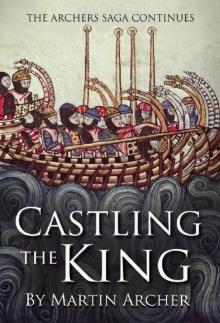 Castling The King
Castling The King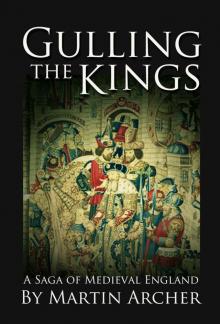 Gulling The Kings
Gulling The Kings Israel's Next War
Israel's Next War Our Next Great War
Our Next Great War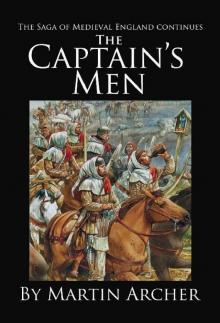 The Captain's Men
The Captain's Men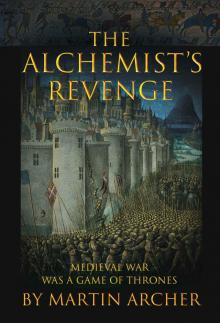 The Alchemist's Revenge
The Alchemist's Revenge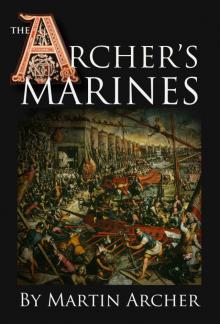 The Archer's Marines: The First Marines - Medieval fiction action story about Marines, naval warfare, and knights after King Richard's crusade in Syria, ... times (The Company of Archers Book 5)
The Archer's Marines: The First Marines - Medieval fiction action story about Marines, naval warfare, and knights after King Richard's crusade in Syria, ... times (The Company of Archers Book 5)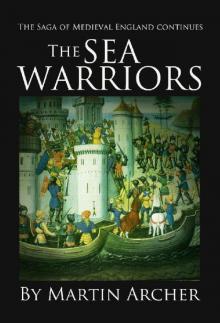 Sea Warriors
Sea Warriors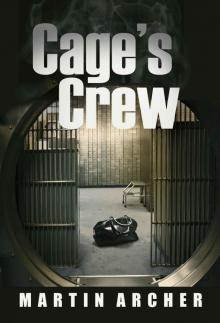 Cage's Crew
Cage's Crew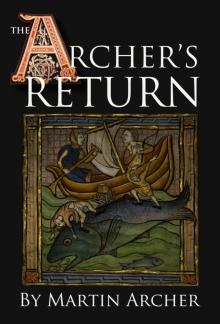 The Archer's Return: Medieval story in feudal times about knights, Templars, crusaders, Marines, and naval warfare during the Middle Ages in England in the reign of King Richard the lionhearted
The Archer's Return: Medieval story in feudal times about knights, Templars, crusaders, Marines, and naval warfare during the Middle Ages in England in the reign of King Richard the lionhearted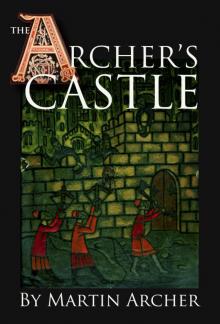 The Archer's Castle: Exciting medieval novel and historical fiction about an English archer, knights templar, and the crusades during the middle ages in England in feudal times before Thomas Cromwell
The Archer's Castle: Exciting medieval novel and historical fiction about an English archer, knights templar, and the crusades during the middle ages in England in feudal times before Thomas Cromwell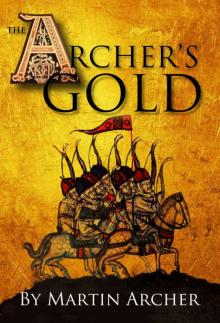 The Archer's Gold: Medieval Military fiction: A Novel about Wars, Knights, Pirates, and Crusaders in The Years of the Feudal Middle Ages of William Marshall ... (The Company of English Archers Book 7)
The Archer's Gold: Medieval Military fiction: A Novel about Wars, Knights, Pirates, and Crusaders in The Years of the Feudal Middle Ages of William Marshall ... (The Company of English Archers Book 7)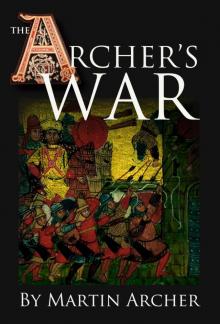 The Archer's War: Exciting good read - adventure fiction about fighting and combat during medieval times in feudal England with archers, longbows, knights, ... (The Company of English Archers Book 4)
The Archer's War: Exciting good read - adventure fiction about fighting and combat during medieval times in feudal England with archers, longbows, knights, ... (The Company of English Archers Book 4)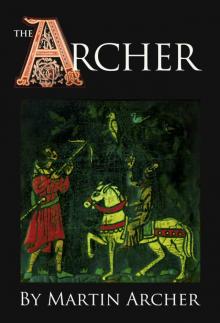 The Archer: Historical Fiction: exciting novel about Marines and Naval Warfare of medieval England set in feudal times with knights,Templars, and crusaders during Richard the lionhearted's reign
The Archer: Historical Fiction: exciting novel about Marines and Naval Warfare of medieval England set in feudal times with knights,Templars, and crusaders during Richard the lionhearted's reign